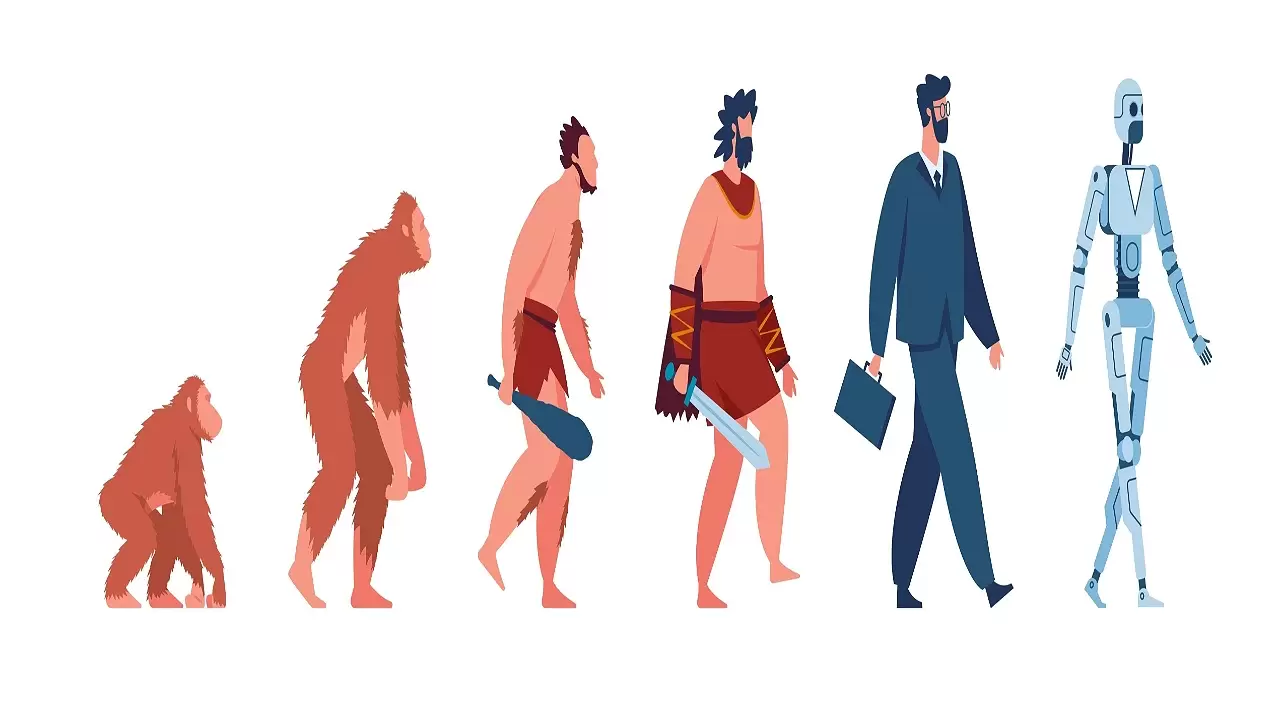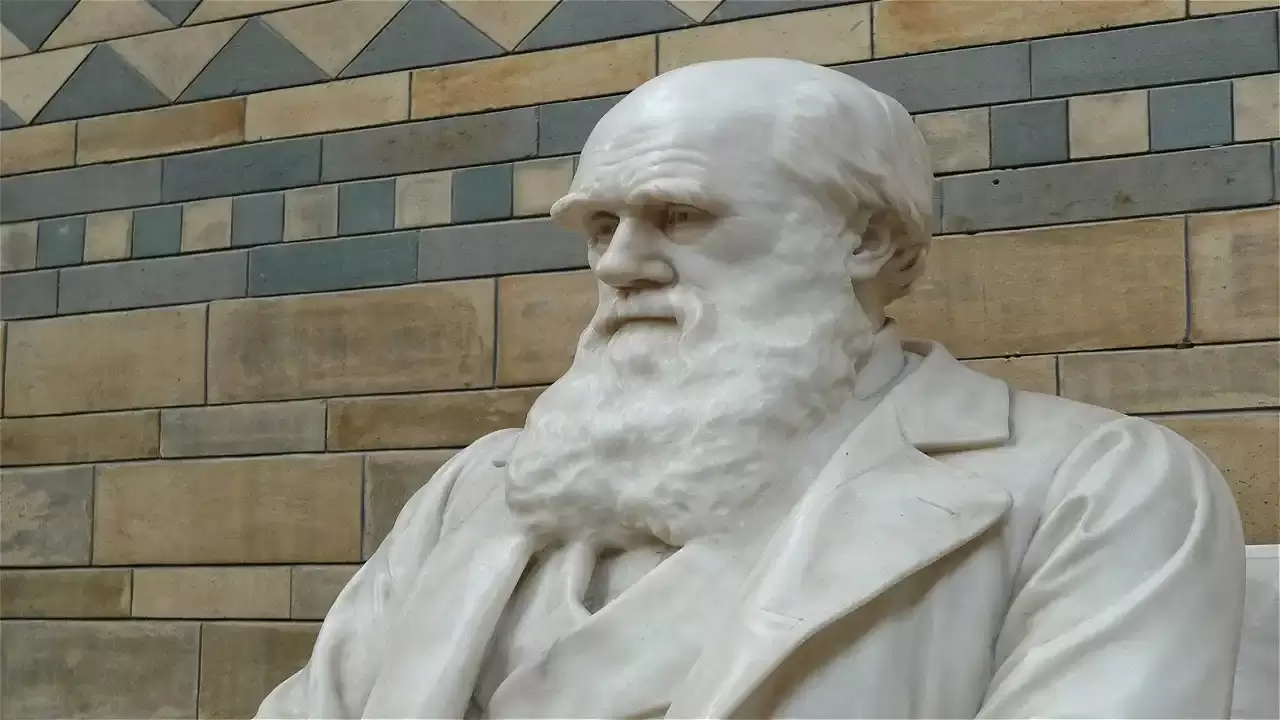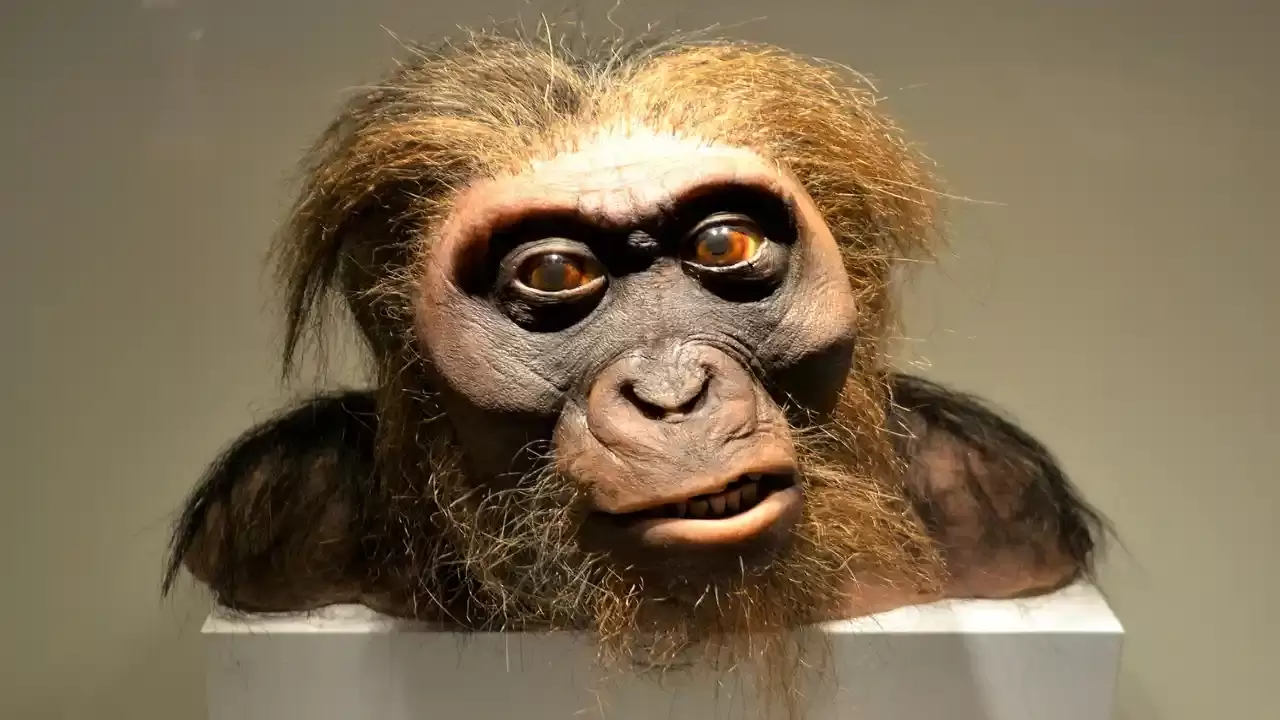
This article deals with the question that has always occupied humanity of Earth's human, fauna, and plant creation. A simple simulation of the first humanoid apes with 46 chromosomes shows that the possibility that humans are derived from the ape is slim. Reverse engineering of the human genome is now possible by combining extremely powerful quantum computers with artificial intelligence, but the conclusions will not be able to be published!
Darwinian evolution is so entrenched, with correct principles of natural selection, that science has not noticed that it is being dragged with theory to the wrong places! The findings of fossils seem to prove the entire evolution theory, but paradoxically, they are misleading. Although there is evidence today that contradicts the original conception of the origin of human beings, no scientist would dare openly oppose the theory.
Note: The writer discusses religions from a scientific angle and does not take a position. The writer respects the beliefs of all faiths.
Charles Darwin (father of the theory of evolution) 1809-1882.

Introduction to Darwinian evolution.
The theory of evolution (which Charles Darwin presented in his book The Origin of the Species, published in 1859) is widely accepted among scientists, thanks to genetic analysis and preserved fossils that show gradual development through natural selection.
The principle of natural selection: (Correct principle)
The principle of natural selection reflects that genetic changes contributing to competitive advantage and survival will be passed on to future generations through heredity. Changes that cause the opposite will disappear gradually. (Because the individual will not survive to reproduce)
- Suppose you look at the changes caused by natural selection. In that case, you will notice that these are relatively minor changes, such as the elongation of the giraffe's neck so that it can lap leaves at a higher altitude, better camouflage colors in reptiles, a suitable beak for fishing in water birds, and more. These minor changes, caused by random mutations, cause genetic changes in future generations only if they serve the survival of that species.
Religious circles disliked the subject of evolution primarily because it provided a scientific explanation for something perceived as the act of creation. I must emphasize that my point of view is not religious but scientific.
- Genesis 1:27: "And God created man in his image, in the image of God created he him male and female created he them." (translation from the text in the Hebrew language)
There are many interpretations of this verse, but a growing school of thought sees this verse as proof of extraterrestrial intervention in the human race. In the Bible, "Helohim" is equivalent to God, but many interpret the word "Ehlohim" as extraterrestrial beings. Given the findings, I am forced to consider this possibility seriously.
Surprisingly, none of the pre-Homo sapiens species survived.
There are dozens of species of apes, but only one human race. (Not a coincidence)
The mystery of the disappearance of our Neanderthal ancestors remains unsolved because not all explanations are convincing.
- Today's humans (Homo sapiens) may be more intelligent, but Neanderthals survived hundreds of thousands of years and disappeared, as did their other ancestors. In my view of extraterrestrial interference in the human genome, things look different.
The disappearance of Neanderthals is not a natural consequence! I leave the scenarios that caused their non-survival to readers who understand there is a guiding hand here. Link: The Neanderthal extinction has an extraordinary explanation.
Statistics indicate that the accelerated development of the human brain is not random!
The 4% difference in DNA between apes and humans may seem minor. However, the 15 million discrepancies in the correct sequence do not result from chance or evolution by natural selection. The human brain is three times larger than a monkey's, and cognitive abilities vary accordingly.
- Darwinian evolution was established in the 19th century when the science of genetics did not yet exist. The Darwinist theory is so entrenched and unquestionably accepted that scientists have not even bothered to test its plausibility, especially since all the apparent findings validate it. The principle of natural selection is valid, but as for everything else, a closer look casts significant doubt.
The human brain's 10% efficiency is astonishing because it indicates a waste of resources. (It contradicts the principles of Darwinian evolution.)
- Natural selection is a phenomenon that does not exist naturally in nature. Darwinian evolution's principle of natural selection is based on the relatively competitive survival advantage of random genetic changes. A considerable excess of resources, without any competitive advantage, contradicts this principle and points to a deliberate hand in human genetics.
- Ape fossils that are 50 million years old indicate only slight changes compared to today's apes. Supposedly, in 50 million years, according to the principle of evolution of natural selection (a correct principle), we would expect to see a monkey today lighting a fire and talking. A situation that would undoubtedly have improved their survival.
The theory of evolution has two main problems unrelated to natural selection.
Link: Evolution (Wikipedia)
The two main problems with the classical theory of evolution are that no plausible explanation exists for creating life from chemical compounds (Abiogenesis), and second-order evolution, in which species change while changing the number of chromosomes, is not supported by a mathematical simulation, even a fairly simplistic one.
The DNA molecule is a marvel of highly complex binary code that is unlikely to have been created spontaneously. (Abiogenesis)
Abiogenesis is completely unlikely to happen randomly.
- Some convincing scientific theories try to explain the formation of life on Earth (Abiogenesis). However, if you add up all the variables, you will get impossible coincidences!
- A constant energy source had to be found for life to exist on Earth. (Apart from lightning) Life began after the creation of single-celled plankton that could carry out photosynthesis. The chlorophyll that enables photosynthesis is a pretty complex molecule, DNA, by chance! Succeeded in producing the most efficient photovoltaic cell formula in nature. By analogy, it's like asking a newborn baby to write the operating system for all the computing in the world.
Second-order evolution, with a change in the number of chromosomes, is theoretically possible but not plausible.
- The addition of chromosomes, doubling, tripling, or multiples of one and a half times the number of chromosomes is the possible result of complex mutations, which often lead to the death of the offspring or cause severe disability. Theoretically, gradually, any combination of chromosomes is possible. Still, to produce fertile offspring, it is necessary to have a healthy, non-infertile adult and a partner of the opposite sex with the same number of chromosomes in the window of time that allows fertilization. It is a very improbable scenario.
The thought that everything in nature is conducted randomly is a thought we would like to believe in, but it does not correspond to reality.
A simple simulation of the first human ancestors—apes with 46 chromosomes illustrates that it is unlikely.
Link: The biggest scientific mistake in history.
I present a simple methodological simulation of the first apes that underwent the mutation that reduced their chromosome number to 46, as humans have.
- Mutations caused the first-ever ape to fuse chromosomes, which were born with 46 chromosomes like humans. Instead of 48. (In most cases, such changes result in a sick animal with low survival.)
- Suppose the (first) ancestor was healthy and survived; it could not have produced fertile offspring with another great ape. Such hybridization would have created an ape with 47 chromosomes (similar to humans with Down's syndrome), and most likely, that hybrid child would be infertile. (Similar to a mule, which is a cross between a horse and a donkey)
- Another possibility (even less likely) is that two identical mutations were created within a short time interval among opposite sexes that allow sexual reproduction.
- Since evolution requires inheritance, if such a pair were formed, the two individuals would have to mate with all the other individuals.
- Monkeys, including great apes, avoid incest, so this is unlikely. The first was created with 46 chromosomes because it required the nuclear family's mating.
The conclusion that humans descend from apes seemed self-evident at the time, but on closer inspection, it does not stand the test of logic! Although ancient humans resembled monkeys, the conclusion that they are a direct result of evolution from apes, which is entirely random and spontaneous, will not stand up to a much more accurate simulation.
Statistically, it is unlikely that humans originated from the apes!

The simulation of human ancestors—Allegedly apes with 46 chromosomes.
According to all indicators, the evolution of humans from apes began approximately 7-10 million years ago. Evolution is not an acquired trait; it must serve a survival purpose and be inherited. In mammals, only sexual reproduction is performed. (No self-fertilization)
- Humans have 46 chromosomes, compared to apes (chimpanzees, gorillas, and orangutans have 48 chromosomes). There is evidence that chromosome 2 in humans is formed from the fusion of two other chromosomes, which also exist in apes. Therefore, the theory of evolution is not contradictory.
The contradiction is found in the first iteration of apes with 46 chromosomes. (Allegedly our ancestors)
- The mutation of chromosome 2 fusion (reduction of chromosomes) had to be carried out in a male and a female within a relatively short time window between the life expectancy at that time and the period of fertility.
Hybrids that do not have the same number of chromosomes usually do not survive and, at best, are sterile. (Similar to a mule, which is a hybrid of a horse and a donkey)
- This means the same chromosome 2 fusion mutation in the great apes but in the opposite sex would have occurred on a parallel schedule. And if that wasn't enough, those couples had to meet and produce fertile offspring!
A hybrid who underwent chromosome 2 fusion (with 46 human chromosomes) mated with an ape with 48 chromosomes would, at best, produce a sterile hybrid incapable of any evolution. (quite similar to a mule)
The scenario of an identical mutation in small time intervals in members of female and male great apes that managed to mate and reproduce becomes statistically extremely weak. It requires more solid explanations than the existing ones. It is essential to develop the mathematics and statistics of second-order events, in which animals evolved from entirely different animals with different numbers of chromosomes because they are doubtful as random events!
Second-order evolution, while changing the number of chromosomes, is statistically unlikely.
- For example, the modern horse descended from an ancient canine family member in a documented, graded process that took about 50 million years.
- Horses have 64 chromosomes (32 pairs), while dogs have 78 chromosomes (39). A gradual process is required here, unlike in humans and monkeys, where the difference is a single pair. Adding and subtracting chromosomes is possible, as it also happens in humans. However, in humans, it causes Down syndrome, and in animals, it often causes morbidity and death.
Let's assume for a moment that "a new dog with 76 chromosomes or maybe less" is indeed created. It is still not enough. Pairings of species with an unequal number of chromosomes often lead to health problems, death, or sterility, similar to the case of a mule, a cross between a horse and a donkey.
Evolution is only inherited. Therefore, the same mutation, with the same number of chromosomes, was supposed to occur in a member of the opposite sex so that they could produce fertile offspring. The probability of a double mutation event, but in the case of the opposite sex, it randomly stands for the power of minus 50 or higher! (completely unlikely)
Why didn't the great apes undergo a similar evolution to humans?
Monkey fossils have existed for over 50 million years. The remains of nearly 10 million-year-old apes exist, except for a (relatively) small monkey that stood up; there is no evidence of significant genetic changes or improvement, as could be expected over millions of years.
- The central claim of paleontologists and evolutionary scientists is that the monkey is adapted to forests and a rainy environment, walking on all fours and using its survival. But this claim has a fundamental flaw! The human brain has grown to about 3 times the size of a monkey's brain. Imagine an intelligent monkey who can build a shelter and start a fire. Their survival would have improved many times over. The explanation that apes are not the same species as humans is proper but inconsistent.
If human evolution is random, it should have worked about the same on monkeys and other animals. Wisdom is a first-rate survival trait.
How could extraterrestrials upgrade the human genome without kidnapping women?
- Genetic engineering viruses are the simplest and most effective way to rapidly change the human genome in large populations. These viruses penetrate host cells and modify them in a way that is passed on to offspring. Link: Extraterrestrials created viruses to upgrade humans genetically.
Some viruses passed from animals do not result from genetic engineering by extraterrestrials.
- Viruses that were not highly propagable were usually not created by advanced extraterrestrials but passed from animals to humans. It is essential to emphasize that animal viruses also originate from the genetic engineering of extraterrestrials. Viruses are rare and do not serve genetic enhancement because their distribution is low and often more virulent.
The fact that the human genome contains between 8% and 10% of viral origin underscores the enormous extent of the genetic upgrade that the human race has undergone. (The genetic gap between humans and apes is only about 4%.)
Summary and Conclusions.
Link: Adrian Dvir (Wikipedia). Adrian Dvir's books reveal the most comprehensive, unusual, and fascinating information about extraterrestrials.
- Adrian Dvir's books unequivocally mention the genetic enhancement of humans, today's hemo-Ephesians, by extraterrestrials. Similar theories have been raised in the past, and it is possible to dismiss them because they are another conspiracy theory, one of many. Anyone who reads Adrian Dvir's books (highly recommended) will discover a treasure trove of enormous information on extraterrestrial subjects in general, not only in the evolutionary aspect.
- The fact that all the ancestors of Homo sapiens are completely extinct also raises many questions and puzzlements. Of course, if Neanderthals were alive today, more secrets would be revealed, which might have been better left uncovered!
The Book of Genesis describes the order of creation, consistent with the order of evolution. Although the Bible is an ancient document, it is consistent with the evolutionary order.
- The idea that all life on Earth originated from random creation does not stand the test of reality. Choose the version that suits you. I completely understand people who do not seek a scientific explanation and prefer the religious version. Life on Earth is not accidental but the result of God's act.
The thought that extraterrestrials may be part of the creation process on Earth is challenging for humans, believers, and heretics to accept, certainly without solid evidence.
- There is much reliable documentation about strange phenomena involving animals in farms and zoos whose blood is drawn and who are left dead without any logical explanation. There are also countless testimonies of people who have seen or experienced an encounter with extraterrestrials. Until recently, everything was taboo. The issue has become legitimate after official announcements of unidentified aircraft and is back in the headlines.
I do not dispute the genetic and fossil findings that show an evolutionary lineage. However, I must disagree with the attempt to present second-order evolution as a random process.
- It is worth emphasizing that first-order evolution (without chromosomal changes) is consistent with the findings and logic; second-order evolution, particularly in mammals, is not reasonable under the existing assumptions and requires re-examination.
Cat species are known to be able to produce fertile hybrids, sometimes also in nature.
- It is not surprising. Despite size differences, cats share similar features, and all have 38 chromosomes.
When we examine anomalies in humans with 47 chromosomes (instead of 46 chromosomes), we find them problematic.
- These anomalies are less healthy, less developed, and have no advantage of natural selection. Down syndrome is manifested by an extra chromosome 21. The result is familiar. There can be mutations in the sex chromosomes; some produce infertility, and some cause medical, communication, and other health problems, including miscarriages during pregnancy.
The science of computational genetics is approaching the point where quantum super-computers can simulate genetic evolution by reverse engineering from modern Homo sapiens to our ancestors. (Of which we have remnants of DNA)
- I believe the simulation will reveal that the scenario of random evolution is statistically improbable.
The statistical conclusion would indicate that human heredity has undergone continuous enhancement, much more than once!
There is no escape but to choose one of two alternatives for the formation of life on Earth:
- God created everything and is omnipotent. (Religions do not require explanations.)
- Extraterrestrial beings intervened and planted life on Earth, later intervening in the human genome and perhaps all life forms!
The problem is that none of these concepts can be proven or disproven. They will remain unsolved. The reason for this is logical and related to Kurt Godel's theorem of mathematical incompleteness. To illustrate, take the sentence, " Never say never." The sentence is built with self-contradiction, and so is the issue of the formation of life on Earth!
Is the origin of humans from apes? Despite the compelling evidence, Darwinian evolution has many flaws in that aspect. The implications are too far-reaching to put in writing.

The probability that life on Earth arose spontaneously and randomly from existing chemical elements (abiogenesis) spontaneously and randomly is patently unlikely!

